New Pesticide (chlormequat ) ‘Linked to Reproductive Issues’ Found in 80_ of Americans -
Facts Matter with Roman Balmakov - New Pesticide ‘Linked to Reproductive Issues’ Found in 80_ of Americans
Study finds chlormequat in Cheerios and Quaker products: What to know about the pesticide
Four out of five Americans likely have a lesser-known pesticide in their bodies thanks to the consumption of certain foods, according to a new study.
Published in the Journal of Exposure Science & Environmental Epidemiology on Thursday, the study found that 80% of tested Americans had the chemical chlormequat in their systems, a plant regulating agent that is currently not approved for use on edible crops in the U.S. Imported foods treated with chlormequat are allowed to enter the country, however. According to a brief published alongside the study by the advocacy organization Environmental Working Group (EWG), the findings "ring alarm bells," as the chemical is thought to be harmful and was found in common oat and wheat-based products, including Cheerios and Quaker Oats.
Here's what to know about the findings.
What products were found to contain chlormequat?
Researchers found the presence of chlormequat in both traditional and organic oat and wheat-based foods.
Researchers tested conventional oat-based products purchased in June and August 2022 and May 2023. Of both sets, chlormequat was detected in 92% of the tested products. Organic oat-based products had a lower detection rate of 12.5%.
A sample of conventional wheat-based products tested in February 2023 also found that 22% had traces of chlormequat.
The study authors tested several individual items from a variety of brands for the presence of chlormequat. The chemical was found in several General Mills products, including Cheerios; Quakers Food products including oatmeal, granola bars and Old Fashioned Oats; and some generic store-brand granola and cereals, including Walmart and Target.
Mollie Wulff, a spokesperson for General Mills, told USA TODAY in a statement: "All our products adhere to all regulatory requirements. Food safety is always our top priority at General Mills, and we take care to ensure our food is prepared and packaged in the safest way possible."
PepsiCo, which owns Quaker Foods, did not immediately respond to request for comment.
Scientists don't know the exact impact of chlormequat on the human body, as testing has been focused on animals thus far.
Some prior studies have found that chlormequat is linked to infertility, disrupted fetal growth, delayed puberty and disruptions to the metabolic system. However, these studies were performed on mice and rats and have not been conducted on or translated to humans.
EWG said that studies on the pesticide are ongoing but argued, "Although these studies focus only on the chemical’s potential effects on animals, they raise questions about whether it could also harm humans. "
The EWG also noted a 2023 proposal by the EPA to allow the use of chlormequat on barley, oat, triticale and wheat grown in the U.S. for the first time following chlormequat manufacturer Taminco's application to do so in 2019. EWG has said they oppose the plan.
-
 4:43
4:43
Vigilant News Network
3 months agoA Pesticide You Probably Never Heard of Could Be Affecting Your Fertility
2.52K7 -
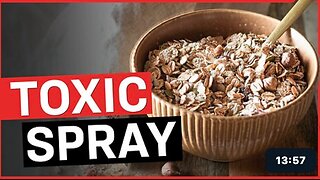 10:03
10:03
USAFrontlineDoctors
3 months agoNew Pesticide ‘Linked to Reproductive Issues’ Found in 80% of Americans
4761 -
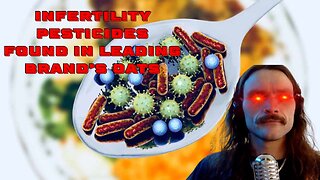 2:54
2:54
yungwookjesus
4 months agoInfertility Pesticides Found In Leading Brand’s Oats
83 -
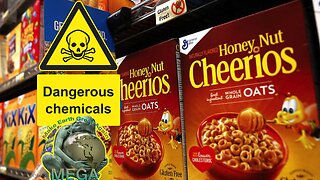 8:56
8:56
RAVries
3 months ago80% of Americans POSITIVE For Dangerous Chemical Found in Cheerios, Linked To INFERTILITY: Study
1.05K1 -
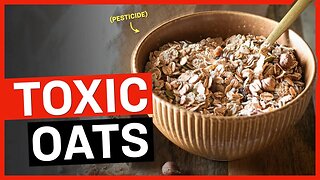 13:57
13:57
Asher Press
3 months agoNew Pesticide ‘Linked to Reproductive Issues’ Found in 80% of Americans
6531 -
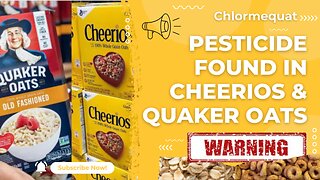 4:43
4:43
Great Videos Now
3 months agoPesticide found in Cheerios & Quaker Oats
57 -
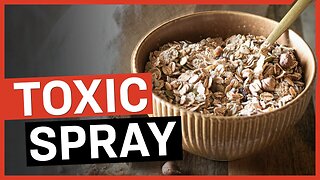 13:57
13:57
galacticstorm
3 months agoEPOCH TV | New Pesticide ‘Linked to Reproductive Issues’ Found in 80% of Americans
2941 -
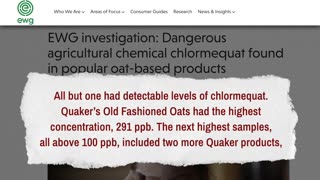 13:57
13:57
Rolling With You
3 months agoNew Pesticide ‘Linked to Reproductive Issues’ Found in 80% of Americans
6583 -
 13:11
13:11
RRPSHOW
3 months agoTest Found Over 80% Of Americans Have a Pesticide in Them From Oats and Cheerios | @RRPSHOW
34 -
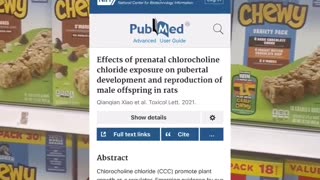 0:59
0:59
Renard
2 months ago☢️CHLORMEQUAT ☣️
2.1K10